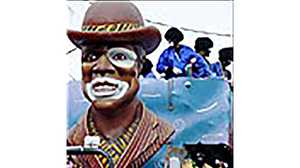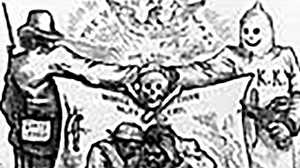Theme & Variation: a conversation with George H. Buck, Jr.

"New Orleans was the birthplace of jazz," George Buck asserts. "Other places in the South they didn't allow the slaves to play drums because they were afraid that they might send messages, you see, for a revolt. In New Orleans, just like it is today, everything goes. You have dances, you have Congo Square where everything started."
George H. Buck, Jr. runs a non-profit association that maintains a collection of early jazz recordings. Listen to five tunes from the early days of jazz and read one New Orleanian's thoughts on the origins of jazz. His love of music and his love of his hometown shine through.
"Everything started in New Orleans. The Confederate Army dumped their instruments here. The instruments were readily available to any one who just had a few dollars to buy them, so we had all that going here. They did not have that in other places in the South. The beboppers tried to claim that the music was instantaneously born everywhere, but it wasn't just born everywhere."
George Buck's records keep important early recordings in print, as essential to the future of jazz as its history. "[Conservatory taught musicians] know how to teach music in written form so that's why they get the arrangements of Glenn Miller, Duke Ellington, Count Basie or something like that, but they don't know how to play traditional jazz because that's something you have got to feel. So you just can't teach it. That's the way it is."
What a Friend We Have in Jesus
Songwriter: Charles C. Converse
Performed by: Excelsior Brass Band from "The Essence of New Orleans Jazz
That's a traditional old gospel number. A jazz band can play anything, it can play a hymn or pop song on the hit parade, it doesn't matter. In New Orleans the religious tunes are as important as the jazz tunes. Religion is very important to the early beginnings of New Orleans jazz. A lot of the jazz musicians in New Orleans were brought up in the church so they have respect for the church. It's the way they improvise it, and the feeling, that makes it jazz.
"What a Friend We Have in Jesus" is played on the way to the funeral home. So it's usually done as a slow dirge. And then coming back from the cemetery the band might play "When the Saints Go Marching In," another religious tune, but totally different. It's a totally happy philosophy; the person should be happy that they have died because they are going off to a better life. It's got to be better than what they had, they're freed of the problems they had in life.
Eh, La Bas
Songwriter: Traditional
Performed by: Wooden Joe Nicholas from "Wooden Joe Nicholas" recorded 1945
That's a Cajun song. They played a lot of the Cajun songs. It's got a lot of, well, not exactly French, but French influence. Everything was mixed together. They were just playing the popular music of the day. "Eh, La Bas" was a popular tune of New Orleans and so they played it. In the early days of jazz the black musicians were trying to copy the white man's dance music, but they didn't have the training, they didn't study music so they didn't know how do it, so they improvised on it. And out of that attempt -- which was, of course, a complete failure to copy the white man's music -- they came up with a form of music that was so far superior. We reached for the improvisation, and the art of improvisation had dropped out of classical music, and jazz brought it back.
The art of ensemble improvisation is the most important part of New Orleans jazz, where in Chicago style jazz the art of solo improvisation became more important. The basic instruments of the ensemble were trumpet, trombone, clarinet, maybe piano, then banjo, bass and drums. And everybody's improvising. The trumpet took the melody, the trombone filled in, clarinet played obligato and so forth. They were all improvising but they didn't clash, they were all playing their parts. Not playing the same thing, but doing their own thing in their own parts.
Careless Love
Songwriter: W.C. Handy
Performed by: Wooden Joe Nicholas from "Wooden Joe Nicholas" recorded 1945
That starts out with the improvised blues. It's the blues, strictly the blues, you can hear the instruments all coming in at different times. It's very stirring to see the band doing it. Then they go into the theme of "Careless Love" and improvise on it.
Jazz is not a sophisticated music. It's hard-hard-nosed music. It's music that you have to get down and get with it. It wasn't played for polite society, it wasn't played on George Washington's Day when they were pouring the tea in the Boston bay. This came from the South where things were lowdown and dirty and that's the way it was. New Orleans jazz is a heartfelt form of music.
Obviously, our music was very complex, you have the various rhythms taking place in jazz bands and the improvisations, it wasn't what they call "nice-nice" music. It's very difficult music to play, and it's totally American.
I Ain't Got Nobody
Songwriter: Roger Graham, Spencer Williams
Performed by: Wooden Joe Nicholas from "Wooden Joe Nicholas" recorded 1945
"I Ain't Got Nobody" is a pop tune of the day, but when it's done New Orleans style it's completely different. It has the improvisation. The trumpet plays the melodic line, and there are variations, of course, because he's playing it his own way, he's not playing it straight. He may change it [sings staccato: I-ain't-got-no-bo-dy] or [sings iain'tgotnobody] add slurs, and the trombone's doing his fill ins and the clarinet's doing the obligato and between them you have a full frontline there. But they're all doing their thing there, following the trumpet doing the lead, and the drum and bass are keeping the beat, with the easy feeling that you get in New Orleans.
They are not skilled musicians, but they have a deep feeling for the music. In New Orleans style the heart is closer to the surface.
Dill Pickles
Songwriter: Charles L. Johnson
Performed by: New Orleans Ragtime Orchestra from "The Essence of New Orleans Jazz"
Ragtime came out of the Missouri area with Scott Joplin. It's more of a structured music. All the music was called ragtime. You can tell ragtime when you hear it. It's not the free-for-all like jazz. It's more sophisticated, more polite. Jazz was growing in New Orleans and ragtime in St. Louis. There are a lot of different styles in traditional jazz. You have the Harlem stride style, you have the barrel-house style, boogie-woogie. It was all part of what came out of New Orleans.
We just have a good time. Down in New Orleans, we just enjoy it. We went to dances. Dancing was a very important part of jazz music. People like to dance. and that's why it came about.







